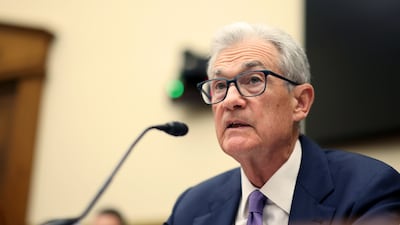Federal Reserve Chairman Jerome Powell told the US Congress on Wednesday that the central bank needs more confidence before it begins cutting interest rates, restating the case he and other officials have made this year.
In prepared remarks before the House Financial Services Committee, Mr Powell said he believes the Fed is on track to begin dialling back rates sometime this year, but offers no timeline on when this might begin.
“If the economy evolves broadly as expected, it will likely be appropriate to begin dialling back policy restraint at some point this year,” he said.
“The committee does not expect that it will be appropriate to reduce the target range until it has gained greater confidence that inflation is moving sustainably towards 2 per cent.”
Wednesday's testimony was the first that Mr Powell will give on Capitol Hill this week. He is scheduled to deliver remarks before the Senate Banking Committee on Thursday.
Mr Powell was expected to be questioned on the burden that high interest rates have placed on consumers. The Fed began raising interest rates in 2022 to curb US inflation, which peaked at 7.1 per cent that summer.
Inflation has significantly fallen to its current 2.4 per cent level since the Fed raised rates to their current 5.25 per cent to 5.50 per cent target rate.
Still, last month's inflation report showed price pressures increased from December to January, highlighting the Fed's bumpy path back to its 2 per cent goal.
Meanwhile, a Labour Depatment survey on Wednesday showed job openings changed little at 8.9 million last month, underlining the continued demand for workers. Fed officials have pointed to the labour market's strength as a reason to keep rates elevated.
The central bank's aggressive rate increases have made costs such as car loans and interest on credits cards more expensive. Higher interest rates have also played a role in higher mortgage rates, making the cost of buying a home more expensive.
But returning to 2 per cent is also “not assured”, Mr Powell warned, as he cautions against the risks of holding a restrictive stance for too long or too little.
“Reducing policy restraint too soon or too much could result in a reversal of progress we have seen in inflation and ultimately require even tighter policy to get inflation back to 2 per cent. At the same time, reducing policy restraint too late or too little could unduly weaken economic activity and employment,” he told the US House panel.
Officials at the Fed have pushed back against suggestions that they could cut interest rates early this year. Mr Powell went even further after their first meeting in July by effectively ruling out a rate cut in March.
Timing on the Fed's rate cuts will also be closely monitored by the UAE, Qatar and other Gulf countries whose central banks follow the Fed decisions to protect their currencies' fixed exchange rates against the US dollar.
Traders now expect the first rate cut to occur in June, according to data from the CME Group. They also expect three to four quarter-rate cuts this year, which is roughly in line with the Fed's projections from December.
The Fed will release its updated economic projections at the end of its March 19-20 meeting.


